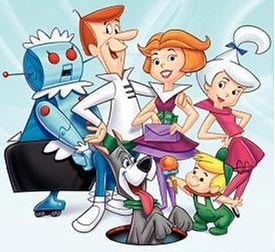I finished reading TGG last night. My conclusion---good book, it makes you think. Just as a sidebar, most books that I was assigned in High School, when I have read them as an adult, I still didn't enjoy them. However, TGG was really good as evidenced by the fact that I finished it in a couple of evenings. Judy is resisting my placing her report in this blog. Something about "other people" stealing her ideas even though there are about a million sources offering various interpretations of TGG all over the internet so why are her's so important. Talk about hubris.
Anyway, one can speculate on the meanings of the three principle symbols FSF created in his novel. The Valley of Ashes operates on multiple levels. Representing the ravaging of the environment during the industrial revolution and where the wealthy irresponsibly dispose of their problems without considering the consequences. This is a desolate ghetto-like region, whose inhabitants (like George and Myrtle Wilson) are desperate for a chance to escape to a better life. In their desperation they commit immoral acts that have consequences they cannot escape. Overlooking them are the eyes of Doctor T. J. Eckleberg, which everyone believes represent God. But is he a punishing God, like I was taught in grade school or a caring God like that offered to today's masses. You be the judge. Myrtle trys to escape her hopeless situation by having an affair with the rich Tom Buchanan (whose never going to leave Daisy and marry Myrtle) and for her troubles gets her nose broken by Tom during an argument and her body torn apart by Daisy in a car accident. George Wilson is so broken over Myrtle's affair and her death that he goes and murders the innocent Gatsby and then commits suicide. That sounds like a God with a warped sense of fairness. Or maybe that's the point FSF was trying to make. The rich get away with murder (literally and figuratively) and the poor suffer. Lastly, the green light. That symbol didn't resonate with me, but I think it refers to one's dreams or aspirations that are always out of reach.
There is also the thought that FSF cast Gatsby as a Christ-like figure. At one point in the story FSF refers to Gatsby as the son of God (his father being God, I guess) and later at the end as Mr Gatz (Gatsby's father) is talking to Nick he says, "He (referring to Gatsby) had a big future before him, you know. He was only a young man.....If he'd lived, he'd been a great man....He'd of helped build up the country." One could say the same thing about Jesus Christ. Maybe there wouldn't be so much animosity between different religions had JC lived and been able to unite all religions. Just as JC was sacrificed, Gatsby was also sacrificed, but for what end? My thought was that, although tragic, Gatsby knew that he was never going to win Daisy back (green light) and that he didn't care if he lived or died. In the end his death (like that of JC) was tragic because he never fulfilled his potential or attained his goal.
What I have been wondering about is that period after Gatsby fired all his employees and entertained Daisy at his estate. FSF doesn't reveal much concerning their activities other than when Gatsby tells Nick that Daisy spends a lot of time at his estate (wink, wink, nod, nod--elbow to the ribs). What do you think they did there all alone? Were they intimate? Wouldn't it have been interesting if Daisy were pregnant with Gatsby's child when she accidentally killed Myrtle Wilson. Then, after Gatsby's death she raises him as hers and Tom's child and keeps the secret hidden. But she leaves a secret code that will reveal the true identity of the child. Have you ever noticed how the one apostle sitting to the left of JC in the painting of the Last Supper by Leonardo da Vinci looks like Robert Redford?

1 comment:
Whatever happened to the Ah-nold photo? Talk about your Christ figures -- dying so that mankind could live in T2.
I never read TGG, or Hemingway, for that matter, at Walnut. But I did love to read and re-read two books, "The Odyssey" and "David Copperfield" in the years afterwards. I was encouraged recently that DC is one of the favorite books to re-read of Nick Hornby, my hero and author of "High Fidelity" and "Fever Pitch."
Tell Judy I'd love to read her report, and that I won't tell anyone what she says.
Post a Comment